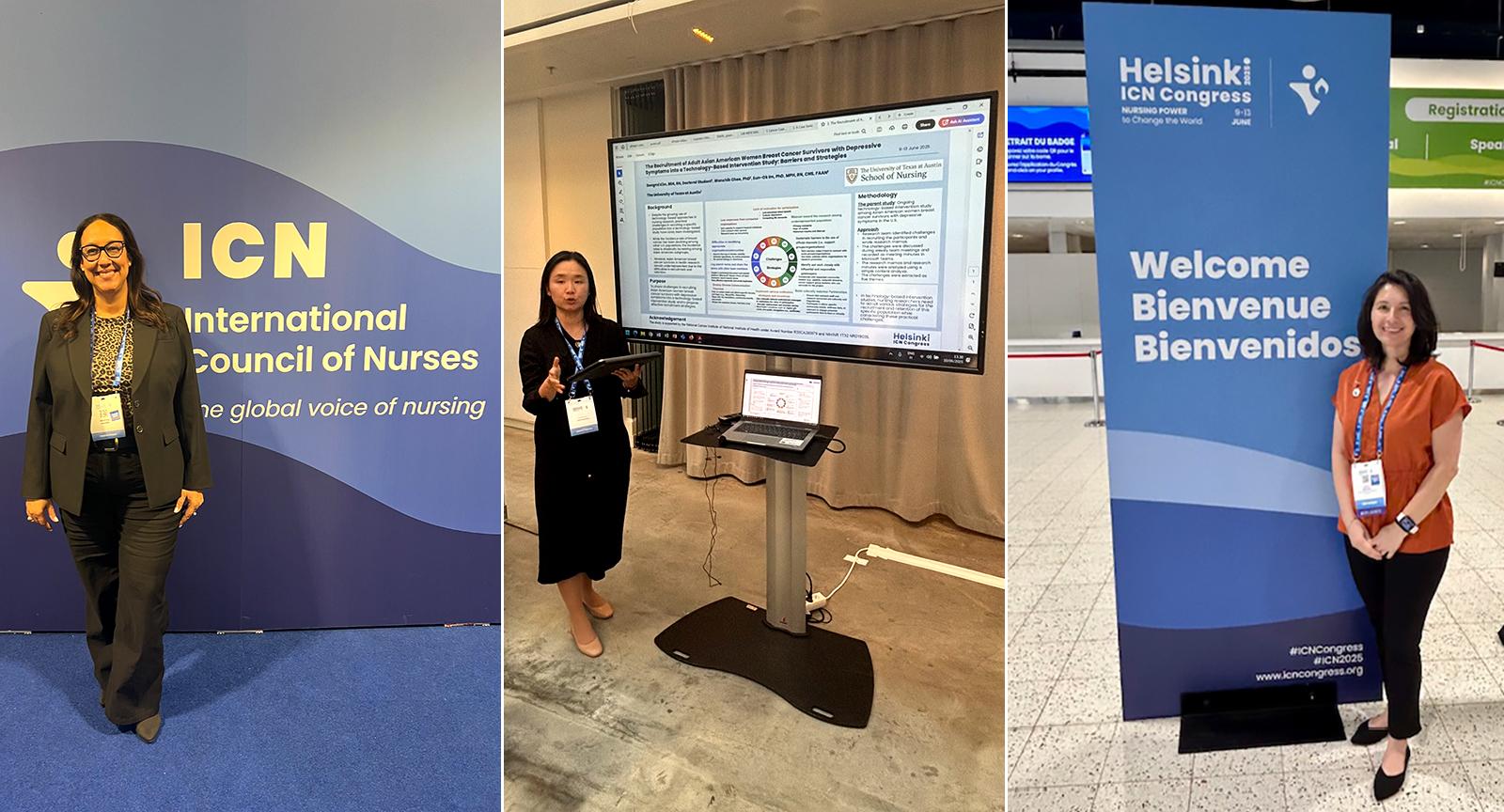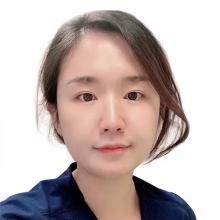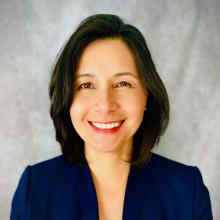
Earlier this month, faculty and PhD students from The University of Texas at Austin School of Nursing participated in the 2025 International Council of Nurses (ICN) Congress, held June 9–13 in Helsinki, Finland.
This year’s Congress marked the 30th gathering of the International Council of Nurses. Organized in collaboration with the Finnish Nurses Association, which celebrated its 100th anniversary, the Congress brought together thousands of nurses from around the world under the theme, “Nursing Power to Change the World.” The event offered opportunities to share knowledge, foster global collaboration and hear from speakers and leaders in nursing and health care.
Spanning Education, Practice and Global Challenges
Representatives from the UT Austin School of Nursing presented their research findings:

Martha Brown, MSN, RNC-OB
PhD Student
Brown presented a poster session featuring her doctoral research in collaboration with PhD students Nancy Blanco, BSN, and Amy Patten, MSN, APRN, FNP-C, titled “Illuminating Pathways to Social Justice in Nursing: An Autoethnographic Journey of Emerging Nurse Scientists.”
Their work considers how exposure to multidisciplinary doctoral coursework grounded in critical theory can reshape the scholarly development of emerging nurse scientists.

Dongmi Kim, BSN, RN
PhD Student
Kim presented a poster titled "The Recruitment of Adult Asian American Women Breast Cancer Survivors with Depressive Symptoms into a Technology-Based Intervention Study: Barriers and Strategies."
This presentation highlighted findings from Dean Eun-Ok Im's ongoing technology-based intervention study focused on Asian American women breast cancer survivors with depressive symptoms. Specifically, Kim shared the barriers the researchers encountered during participant recruitment and the strategies they implemented to overcome them.

Lisa Morris, DNP, RN
Clinical Assistant Professor
Morris delivered two poster presentations, highlighting global health and health equity.
Her first presentation, “Flowing Forward: Impacting Health in Tanzania through Clean Water and Sanitation,” stemmed from a collaborative project developed through Sigma Theta Tau International Honor Society of Nursing Global Advocacy Academy.
Working alongside faculty from institutions including Georgetown University, Wilkes University, Duke University Hospital, the University of Michigan and Nevada State University, Morris helped create a global advocacy action plan focused on three key goals: ensuring access to clean water within a 10-minute walk from home, removing water collection barriers that hinder girls’ education and reducing waterborne disease and contamination to improve community health outcomes.
In addition, Morris and Janice Hernandez, DNP, RN, FNP-C, clinical associate professor, presented work on behalf of Leadership in Diverse Settings student Ebonie Best, MSN, RN, and her preceptor Kimberly Lewis, PhD, RN, CGNC. Lewis also attended the conference to co-present the project.
Their project, “Voices Heard Through Translation: The Impact of Language Barriers and the Effects on Maternal Outcomes,” examined how language barriers in labor and delivery settings contribute to suboptimal care and adverse events. The project advocated for improved communication strategies to promote patient safety, enhance care quality and increase satisfaction among linguistically varied populations.
Advancing through connection
The Congress provided an opportunity for School of Nursing doctoral students to connect with nurse leaders, researchers and educators from around the world, strengthening global networks and advancing shared goals in health care.
Brown said it allowed her to amplify the message that nursing, as a caring science, must continually evolve to address systemic inequities and power imbalances.
“Sharing our work in this global forum underscored how vital it is to integrate critical theory, interdisciplinary engagement and reflexivity into nursing education,” she added. “It also affirmed that our personal experiences and cultural insights are not only valid but essential to advancing equity in the discipline.
“Presenting at the ICN Congress was a particularly meaningful experience for me,” Kim said. “It was deeply inspiring to reconnect with a global nursing community and to see firsthand how nursing continues to evolve across cultures and health systems. The opportunity to share ideas and learn from international colleagues reignited my passion for advancing nursing science and practice.”
Local work, global impact
Presenting research on an international stage is vital for advancing nursing science and practice worldwide. It allows researchers to share innovative ideas, evidence-based solutions and best practices with a diverse global audience, fostering collaboration across cultures and health care systems.
Brown believes international platforms, like the ICN Congress, push nurses to consider the broader implications of their work.
“They invite dialogue with scholars from across the globe who may be addressing similar issues through different frameworks,” she added. “For students, it’s a transformative experience and an opportunity to test ideas, receive feedback and expand our scholarly networks. It also reinforces that the work we’re doing locally contributes to global conversations on justice, health and education.”
Kim sees international presentation as a valuable opportunity to learn how nurse researchers and practitioners around the world are advancing clinical practice and nursing science within their unique cultural and health care contexts.
“It offers a meaningful way to contribute to global health dialogue, understand how their work fits into the broader international landscape, and build lasting professional networks with colleagues across the globe,” she concluded.